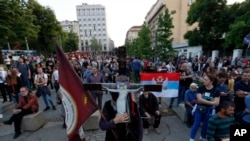Montenegro, the first European country to declare itself free of the coronavirus, plans to open its borders to citizens of several European countries except for former ally Serbia — drawing angry reaction Tuesday from Serbian officials.
Montenegro's prime minister said Monday its borders will be opened June 1 for citizens of countries that meet the entry criteria set by Montenegro's health authorities: to have at most 25 COVID-19 patients per 100,000 inhabitants.
Premier Dusko Markovic said states that meet the criteria are Croatia, Slovenia, Austria, Germany, Poland, the Czech Republic, Hungary, Albania and Greece.
"We will open the borders to the countries that have a similar epidemiological status," he said. "We will not ask for special tests, everyone will receive clear instructions on what awaits them in the country and what regulations they must respect."
Markovic didn't mention neighboring Serbia, triggering an angry rebuke from Belgrade — even though Serbia isn't saying that it meets Montenegro's entry criteria. Serbs traditionally are the most frequent visitors to Montenegro, which depends on tourism.
Serbian Foreign Minister, Ivica Dacic called Montenegro's decision "ridiculous" and politically motivated and Serbian Prime Minister Ana Brnabic said it shows that Serbs are unwelcome in the Adriatic state. Both said Serbia for now won't introduce reciprocal measures.
Serbian Defense Minister Aleksandar Vulin said the Montenegrin entry "ban" will further fuel anti-Serb sentiment.
"The government in Montenegro is not fighting against the virus, it is fighting against the Serbs," Vulin said Tuesday.
The last recorded case of coronavirus in Montenegro was about three weeks ago. The country declared itself free of COVID-19 on Sunday.
A country of 620,000, Montenegro split from much larger Serbia in 2006, but many in Montenegro and Serbia still remain opposed to the separation. Serbs represent about 30% of Montenegro's population.
Tensions between Serbia and Montenegro have escalated over a religious law adopted by the Montenegrin parliament last year that the Serbian Orthodox Church says would strip it of its property. Belgrade has openly supported mostly peaceful protests by Serbs in Montenegro who want the law revoked.
Montenegrin officials have accused Belgrade and Moscow of trying to destabilize the small state's pro-Western government. Montenegro joined NATO in 2017 despite strong opposition from historic Slavic ally Russia.
Montenegro imposed a strict lockdown to curb its outbreak and recorded only 324 cases and nine deaths. Serbia has recorded over 11,000 cases and nearly 240 virus deaths.




